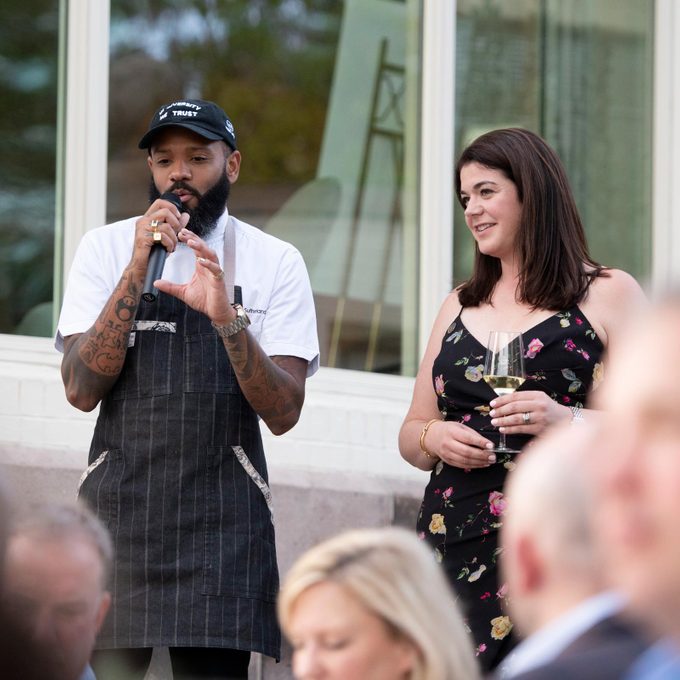TV Chef Justin Sutherland Uncovers a Restaurant Truth Every American Should Care About
Updated: Feb. 28, 2024

"It was another layer of stress in an already high-stress industry," says the Iron Chef winner and Chopped judge.
After winning Iron Chef, opening award-winning restaurants, and starring as a judge on Chopped, chef Justin Sutherland recently took home the Emmy for Outstanding Culinary Host for his series Taste the Culture. It wouldn’t be an understatement to say he’s on top of the world right now…but, like so many chefs, Sutherland might say the success has been a long time coming.
In fact, he started at the bottom, working grueling hours in restaurants for decades. “I’ve worked in hospitality my whole life, from working as a line cook to owning my own restaurants,” he says. There, he got to see first hand what service workers endure—and what little safety net they have.
One of the takeaways that’s stuck with him the most is needing to show up to work regardless of how he was feeling. “I remember being a young cook, living paycheck to paycheck, and we were all terrified of getting sick and missing work because those missed hours could be a missed rent, missed food—and that was really hard, especially when you’re trying to provide for a family,” he says. “It was another layer of stress in an already high-stress industry.”
Sutherland was one of the two in five service industry employees without access to a single paid sick day. Currently, there are 28 million workers across 35 U.S. states who do not have access to any paid sick time, meaning they have to work through illness and injury—regardless of the toll it takes on them…not to mention the health risks to their customers. After all, who wants to eat food prepared by someone suffering from Covid-19 or another nasty bug? “This is a huge problem in America,” he says.
This is why Sutherland has decided to use his public platform to help all workers get access to paid sick leave. This year he partnered with Theraflu to raise awareness of the Right to Rest & Recover campaign and with A Better Balance, a national legal advocacy organization fighting for paid sick leave for all workers.
Justin Sutherland spoke with The Healthy by Readers Digest about what you can do to help the restaurant workers who serve you, how he takes care of his own health, what he eats when he’s sick (it’s soup! But not chicken noodle!) and the recent life-threatening accident that nearly ended his career.

Get The Healthy by Reader’s Digest newsletter
The Healthy by Reader’s Digest: We’ve learned that even you recently had a scary experience when you felt the financial impact of missing work due to illness or injury. Tell us about your boating accident and how that hit your work schedule.
Justin Sutherland: Last year I was in a pretty terrible boating accident. I ended up being in the hospital for almost three months, spent three weeks in the ICU, and my jaw was wired shut for six weeks. It was another six months until I was able to go back to work. I was so grateful to be alive but at the same time I was worried about paying everything from my medical bills to my daily bills. It was the extreme level of being home sick from work.
But it doesn’t have to be on that level. Even the smaller inconveniences like the flu or COVID can really impact people and their livelihoods. Financial stress can also impact your healing. If you’re stressed out about having to pay bills it can take you longer to recover.
That’s what this campaign is really all about: Giving people that peace of mind that the financial aspect is at least being taken care of.
7 Rules for How to Call in Sick to Work
The Healthy: Did you feel pressure to come back to work before you were healed?
Justin Sutherland: I’m fortunate in that my team and people around me really supported me during that time but there was still pressure—mostly pressure I put on myself. I don’t like just sitting still. But I really appreciated my friends and family telling me, “Look, it’s OK to take this time to yourself.”
The Healthy: What advice would you give to people who feel pressured to work while sick?
Justin Sutherland: Not everyone is as lucky as I am, and too many people are really put in an impossible situation. I have been in that situation in the past: Do I go into work so I can make money to support my family, or do I stay home to protect others? I’ve seen my workers come in and say, “I’m feeling absolutely terrible” and I’m like, “Go home!”
At the end of the day no job is worth your health. No job is worth your life. That’s something my recent scare taught me. I really realized the things in life that are truly important and one of those is your own personal health, both mentally and physically.

What To Say When Someone Is Sick, According to Experts
The Healthy: Since you’re a world-class chef, what do you personally eat when you’re sick?
Justin Sutherland: I’m a huge soup fanatic—and that’s true whether or not I’m sick. Although I learned to appreciate soup even more when I had to be on that liquid diet for six weeks. I love a good soup, especially soups with a lot of spice and ginger. Soups with an Asian profile are my favorite, anything from miso soup to pho to tom kha kai (a Thai coconut chicken soup). The spices and seasonings taste good, but they also help things open up, especially when I have a cold.
I Ate Soup Every Day for a Week—Here’s What Happened
The Healthy: One last tip for our readers: What is the one self-care habit you refuse to skip?
Justin Sutherland: Working out. The gym has become a huge part of my recovery. I put in my headphones and escape. Right now I’m focusing on core and bodyweight exercises and the things that just make me feel good all over. I’ve also recently gotten into meditation and I’ve found that even five or 10 minutes a day can make a big difference.
12 Tips for When You’re Too Darn Busy to Get Sick
The Healthy: The Right to Rest is such an important topic. How can people start helping with this cause?
Sutherland: There are some things you can do on an individual level, but this is really about advocacy on a much larger level. We need to change policies within our government, both on the state level and federally, to give workers the right to rest. Because when you’re sick you need that. We need to get it on ballots and in front of our representatives. One way to start that process is to go sign the Right To Rest petition right now.
For more wellness updates, subscribe to The Healthy by Reader’s Digest newsletter and follow The Healthy on Facebook and Instagram. Keep reading:
- Brittany Mahomes on Family Life During NFL Playoffs: ‘It’s So Important To Take Care of Yourself’
- Cyndi Lauper Talks Vibrant Aging—and Staying a ‘Working Girl’ at 70
- “Here’s How I Knew I Had a Brain Tumor”: One Survivor’s Story After a Common Complaint Became Too Much
- Experts Just Named the 8 Best Places to Go on Vacation That Zap Stress (Even After You Get Home)











